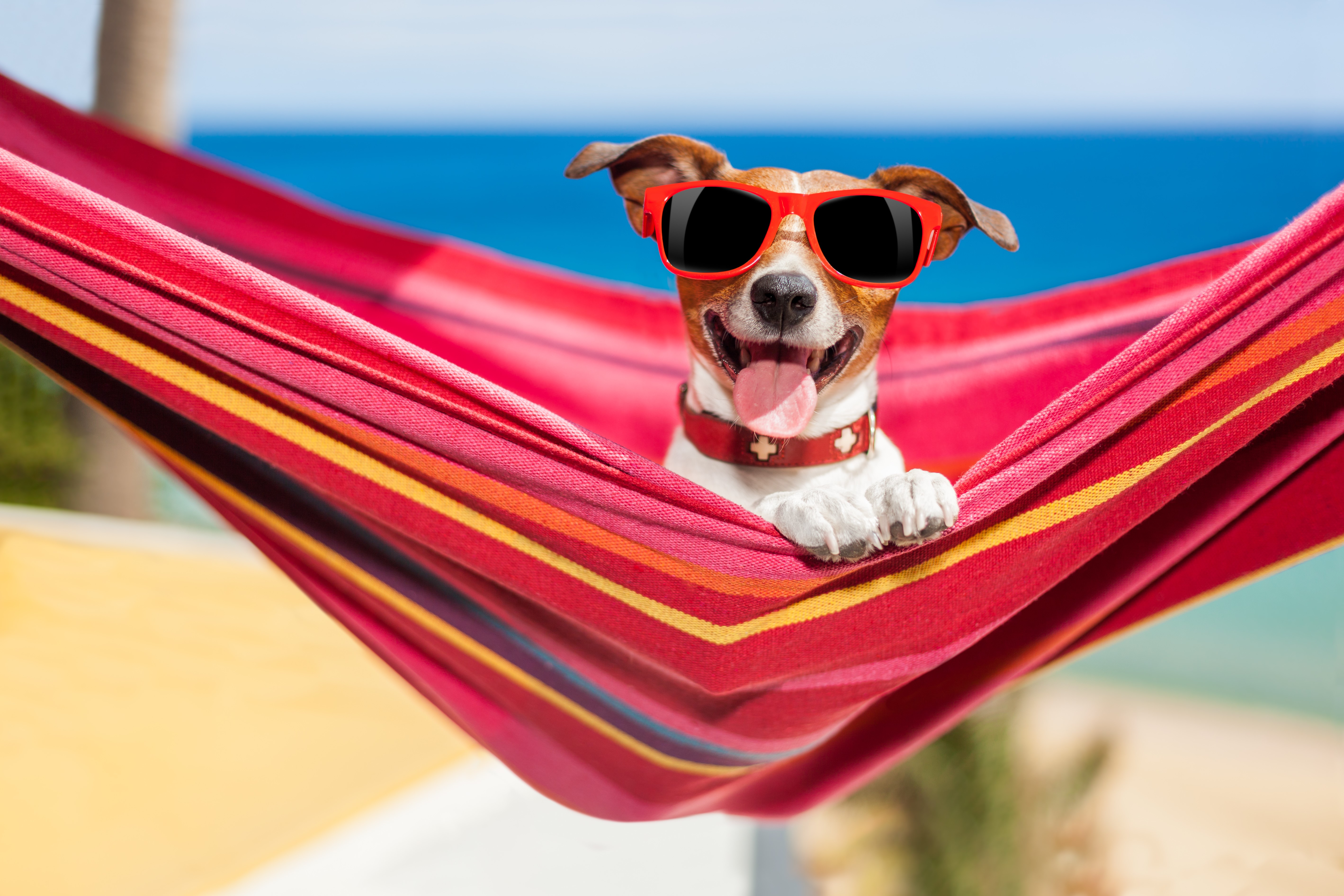
Seasonal Care for your Pet Dogs and Cats
Summer Pet Care
Here are some top tips to protect your pet during summer and hot weather
Summertime means sun, beach, and lots of play outdoors with your dog or cat (did you know that adventurous cats is a growing trend?). Summer can be a great time to bond with your pet. But higher temperatures also mean higher risks for our furry companions - more injuries, more skin and ear infections, and a possibility of a heat stroke.
Pets do not sweat in the same way humans do and can easily become overheated. To avoid this problems and enjoy the summer season with your pet, here’re the tips to keep in mind.
Provide plenty of water and shade
Dehydration in dogs and cats is a real possibility during the summer. Our dogs get much thirstier than we do when they get hot. Signs of dehydration include dry gums and excessive drooling. Make sure your pet always has access to fresh, clean water inside the house and bring a bottle for your furry companion when going outside, just like you do for yourself. You might also switch to a wet dog food during the hotter months to increase fluid intake.
Keep your pet in the shade as often as possible. While dogs and cats like to sunbathe, direct sunlight can overheat them (especially dogs) and lead to heat stroke.
Heat Stroke - Know the signs
A dog's normal temperature is between 100° and 103°F, while a normal temperature in cats ranges from 100.4º to 102.5ºF. Anything higher than that means your pet’s in danger. Dogs and cats don’t sweat like we do. They drink water and pant to bring down their body temperature.
Watch for these possible symptoms of overheating:
-
Heavy panting
-
Dry or bright red gums
-
Thick drool
-
Vomiting
-
Diarrhea
-
Wobbly legs
If your pet shows signs of heat exhaustion, move them to a cool place, give them a drink of water, put a damp towel over their body, and get them to the vet ASAP. Don’t place your pet in cold water that can put them into shock.
Never leave your pet in the car
Most pets love riding in cars. But they wouldn’t enjoy being stuck in it somewhere in the parking lot when it heats up to over 100 degrees. You may think leaving your pet in a car for a few minutes is no big deal. However, it can take less than 10 minutes to develop heat stroke in dogs and cats inside the hot vehicle.
Leaving your pets in cars not only dangerous to your pet, but it is also illegal. So, either take your pet with you or leave it at home. If you see a pet left alone in a car under dangerous condition, take action immediately - try searching for the owner ASAP or even call the police.
Apply sunscreen
Believe it or not, pets get sunburns too, especially those with short or light hair coat. And just like with people, it hurts and can even lead to skin cancer. If you are planning to spend a day out in the sun with your furry companion, apply sunscreens every 3-4 hours to the least hair-covered spots: bellies, ears, and nose. Use only sunscreens made specifically for pets. Your vet could advise on the product suitable for your fur baby.
Don’t shave your pet
You might think shaving your dog a cat for the summer is the best solution to overheating. But a pet's coat is naturally designed to keep it cool during the summer and warm in the winter. Feel free to trim the fur on your pet in the summer, but never shave. Be sure to leave at least a full inch of hair to protect your pet’s skin from sunburns. And don’t forget about your pet’s regular grooming schedule, no matter what season it is.
Mind your walking hours
If you have a dog, walk and exercise your pup only in the early morning and late evening. Never do it in the middle of the day. When outside, take breaks in the shade and have water available.
Keep your dog's paws cool
Pets heat and cool from the bottom up. If you’re out in the sun together, try to keep your pet off of hot surfaces like cement and asphalt – check the temperature with your own foot. Not only can it burn paws, but it can also increase body temperature and lead to overheating.
When spraying your dog with water, make sure to spray the paws and stomach to cool them down quicker. If you are using a wet towel, it’s better to rub their paws and stomach than top coat.
If you can't walk your dog during the early and later hours of the day, doggy boots is a good way to protect their paws.
Winter Pet Care
Here are some top tips to protect your pet during winter and cold weather:
Keep Pets Indoors and Warm
Don’t leave dogs or cats outdoors when the temperature drops. Regardless of the season, short-haired, very young or old dogs and all cats should never be left outside without supervision. Dogs and cats are safer indoors, except when taken out for exercise. During walks, short-haired dogs may feel more comfortable wearing a sweater.
Take Precautions if Your Dog Spends a lot of Time Outside
A dog or cat is happiest and healthiest when kept indoors. If for some reason your dog is outdoors much of the day, he or she must be protected by a dry, draft-free shelter that is large enough to allow the dog to sit and lie down comfortably but small enough to hold in his/her body heat. The floor should be raised a few inches off the ground and covered with cedar shavings or straw. The house should be turned to face away from the wind, and the doorway should be covered with waterproof burlap or heavy plastic.
Help Neighborhood Outdoor Cats
If there are outdoor cats, either owned pets or community cats (ferals, who are scared of people, and strays, who are lost or abandoned pets) in your area, remember that they need protection from the elements as well as food and water. It’s easy to give them a hand.
Give Your Pets Plenty of Water
Pets who spend a lot of time outdoors need more food in the winter because keeping warm depletes energy. Routinely check your pet’s water dish to make certain the water is fresh and unfrozen. Use plastic food and water bowls rather than metal; when the temperature is low, your pet’s tongue can stick and freeze to metal.
Be Careful With Cats, Wildlife and Cars
Warm engines in parked cars attract cats and small wildlife, who may crawl up under the hood. To avoid injuring any hidden animals, bang on your car’s hood to scare them away before starting your engine.
Protect Paws From Salt
The salt and other chemicals used to melt snow and ice can irritate the pads of your pet’s feet. Wipe all paws with a damp towel before your pet licks them and irritates his/her mouth.
Avoid Antifreeze Poisoning
Antifreeze is a deadly poison, but it has a sweet taste that may attract animals and children. Wipe up spills and store antifreeze (and all household chemicals) out of reach. Coolants and antifreeze made with propylene glycol are less toxic to pets, wildlife and family. Read more about pets and antifreeze.
Speak out if You See a Pet Left in the Cold
If you encounter a pet left in the cold, document what you see: the date, time, exact location and type of animal, plus as many details as possible about the situation. Video and photographic documentation (even a mobile phone photo) will help bolster your case. Then contact the RSPCA and present your evidence. Take detailed notes regarding whom you speak with and when. Respectfully follow up in a few days if the situation has not been remedied.
The Best tip of all: Keep Your Pets With You
Probably the best prescription for winter’s woes is to keep your dog or cat inside with you and your family. The happiest dogs are those who are taken out frequently for walks and exercise but kept inside the rest of the time.
Dogs and cats are social animals who crave human companionship. Your animal companions deserve to live indoors with you and your family.
Christmas Dangers for Dogs & Cats
Christmas is the time to indulge, celebrate and have fun – and as part of the family, our pets will normally be enjoying some of the action too. But the festive season also presents a world of hidden dangers to our four-legged friends, from toxic foods to dangerous seasonal plants.
To ensure your pets remains safe this Christmas, here are some things to be aware of:
Poisonous food & drinks for dogs: Chocolate, Christmas pudding and mince pies / Grapes and dried vine fruits (currants, sultanas, raisins), Onions (and garlic, leeks, shallots and chives), Alcohol, Macadamia nuts, Artificial Sweeteners
Poisonous plants: Poinsettia, Holly, Mistletoe, Christmas Trees, Ivy.
Other hazards: Silica gel packs in presents, Christmas decorations are choking hazards, Candle, Potpourri, Cigarettes.
This is just a few examples to consider, find out more on the Royal Veterinary College website. www.rvc.ac.uk/news-and-events/rvc-news/12-risks-of-christmas-keeping-pets-safe
